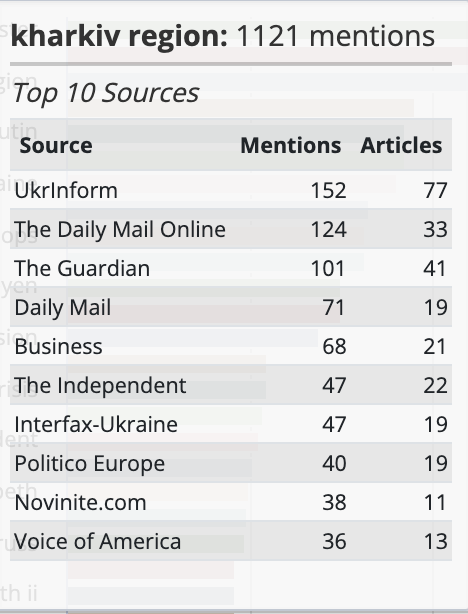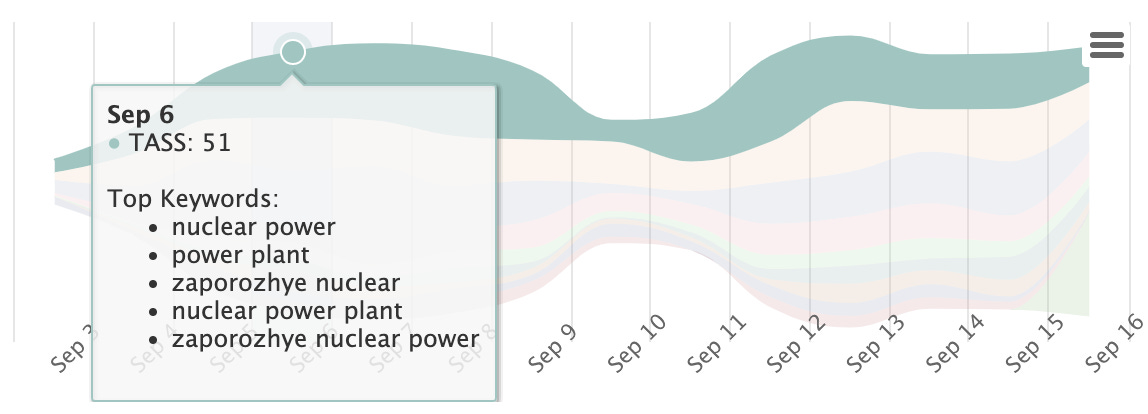
In recent weeks, Ukraine's military has mounted a shocking counteroffensive against Russian troops, forcing a retreat from many vital areas of the country. As a result of the operation, Ukraine has reclaimed most of the Kharkiv region in the northeastern part of the country. U.S. and European Media have covered topics that highlight Russia's recent losses. In contrast to this, however, most Russian sources have turned elsewhere, failing to acknowledge strategic losses.

Media coverage regarding Ukraine has coincided with a few key events:
September 6th:
September 12th:
September 14th:
The trends above display a clear correlation between recent events and the volume of coverage; however, the tone of coverage has varied drastically.

One of the most significant developments of the war has been Ukraine's liberation of Kharkiv. From references to the counteroffensive as a "stunning blow" to Moscow's military prestige to "Putin's Kharkiv disaster," the tone of the media outside of Russia has acknowledged the threat Ukraine's military surge poses to Russia. In an indication of the event's significance, European and U.S. Media mentioned Kharkiv as the 3rd and 4th most common phrase when covering Ukraine-related topics. On the other hand, Russian coverage of the war has failed to provide a complete picture.
Throughout Russian sources' coverage, the focus clearly strays away from Kharkiv. Despite a development that represents Ukraine's biggest gains since the war started, Kharkiv did not even make the list of the top 30 mentions in Russian media.

What little Russian media coverage there is of Kharkiv echoes the Russian Defense Ministry's claim that the Russian military is simply "regrouping" to focus on the Donbas region. Russian media specialist Maxim Alyukov evaluated this wording, stating that Russian media tends to use euphemisms to "suggest that everything is going as planned." The lack of coverage of Kharkiv suggests that Russian media outlets have failed struggled to cover the region in a way that reflects Russian interests. Russian sources have instead opted to flood newsfeeds with coverage of the Zaporizhzhia power plant and Europe's energy crisis.

Russia's largest news agency, TASS, has placed a huge emphasis on the Zaporizhzhia Nuclear Power Plant. TASS Mentioned nuclear in 727 articles over the past two weeks in 100 articles. Of the top 12 most amplified articles, every article mentioned nuclear power. One Russian diplomat blamed Ukraine for the dangers the plant poses saying, "Zaporizhzhia NPPs safety is a priority for Russia, unlike for Kyiv and the West." This refers to Russian claims that Ukraine used U.S.-provided weapons to shell near the plant. Other Russian media have reflected this same sentiment; Sputnik even referenced journalists who claimed to witness Ukrainian saboteurs attempting to storm the power plant.
In addition to blaming Ukraine for nuclear danger, a total of 88 different Russian sources turned to cover the energy crisis instead. Russia Today, for example, covered the Energy Crisis in 50 separate articles over the past two weeks, arguing that the EU's decoupling from Russia is both "impossible and undesirable." This coverage and the Kremlin's blame of the European sanctions for the energy crisis is yet another distraction from Ukrainian gains.
From omitting mentions of Ukraine's recent victory in Kharkiv to blaming Ukraine for nuclear dangers and the energy crisis, Russian media has strategically leveraged the media to further its political goals. Examining trends across three major media landscapes makes it clear that Russia has intentionally avoided coverage of Ukraine's counteroffensive. Instead, the country's state-controlled media has opted to cover the Zaporizhzhia NPP, the energy crisis, and any other topic that favors Russian interests.